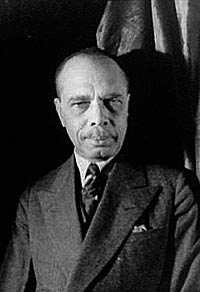Readings:
Psalm 46:1-8
Sirach 39:1-11
Ephesians 6:10-18
Luke 1:57-75Preface of the Epiphany
[Common of an Artist, Writer, or Composer]
[For Artists and Writers]
PRAYER (traditional language)
Eternal God, who gave thy servant James Weldon Johnson a heart and voice to praise thy Name in verse: As he gave us powerful words to glorify thee, may we also speak with joy and boldness to banish hatred from thy creation; in the Name of Jesus Christ, who with thee and the Holy Spirit liveth and reigneth, one God, for ever and ever. Amen.
PRAYER (contemporary language)
Eternal God, who gave your servant James Weldon Johnson a heart and voice to praise your Name in verse: As he gave us powerful words to glorify you, may we also speak with joy and boldness to banish hatred from your creation; in the Name of Jesus Christ, who with you and the Holy Spirit lives and reigns, one God, for ever and ever. Amen.
This commemoration appears in A Great Cloud of Witnesses.
Return to Lectionary Home Page
Webmaster: Charles Wohlers
Last updated: 27 April 2019
JAMES WELDON JOHNSON
POET, 1938
 James
Weldon Johnson (June 17, 1871 – June 26, 1938) was an American author,
politician, diplomat, critic, journalist, poet, anthologist, educator,
lawyer, songwriter, and early civil rights activist. Johnson is remembered
best for his writing, which includes novels, poems, and collections of
folklore. He was also one of the first African-American professors at
New York University. Later in life he was a professor of creative literature
and writing at Fisk University.
James
Weldon Johnson (June 17, 1871 – June 26, 1938) was an American author,
politician, diplomat, critic, journalist, poet, anthologist, educator,
lawyer, songwriter, and early civil rights activist. Johnson is remembered
best for his writing, which includes novels, poems, and collections of
folklore. He was also one of the first African-American professors at
New York University. Later in life he was a professor of creative literature
and writing at Fisk University.
He was born in Jacksonville, Florida, into a middle-class black family of Bahamian ancestry. He graduated from Atlanta University and became the first African-American admitted to the Florida bar. From 1906 to 1913 he was Consul in Venezuela and then Nicaragua; during this period he wrote the fictional Autobiography of an Ex-Colored Man.
In 1913 he returned to the U. S., lived in New York, and engaged initially in songwriting and the theater with his brother, but then became involved in political activism.
In the fall of 1916, because Johnson excelled as a reconciler of differences among those whose ideological agendas seemed to preclude unified, cooperative action, he was asked to become the national organizer for the National Association for the Advancement of Colored People (NAACP). Opposing race riots in northern cities and the lynchings that pervaded the South during and immediately after the end of World War I, Johnson engaged the NAACP in mass tactics, such as a silent protest parade down New York's Fifth Avenue in which ten thousand African Americans took part on July 28, 1917. In 1920 Johnson was elected to manage the NAACP, the first African American to hold this position. While serving the NAACP from 1914 through 1930 Johnson started as an organizer and eventually became the first black male secretary in the organization's history. Throughout the 1920s he was one of the major inspirations and promoters of the Harlem Renaissance trying to refute condescending white criticism and helping young black authors to get published. While serving in the NAACP Johnson was involved in sparking the drive behind the Dyer Anti-Lynching Bill of 1921.
By the 1930's, he had tired of politics, and "retired" as Professor of Creative Literature and Writing at Fisk University. He died in an automobile accident in Maine in 1938.
— more at Wikipedia
and the Poetry Foundation
Johnson is well-known as a poet and author. Some of his published works
include:
Poetry:
* To a Friend (1892)
* A Brand (1893)
* The Color Sergeant (1898)
* Lift
Every Voice and Sing (1899)
* Sence You Went Away (1900)
* The Black Mammy (1900)
* O Black and Unknown Bards (1908)
* Brothers (1916)
* Fifty
Years and Other Poems (1917)
* The
Creation (1919)
* My City (1923)
* God's
Trombones: Seven Negro Sermons in Verse (1927)
* Saint Peter Relates an Incident (1935)
* The Glory of the Day was in Her Face
* Complete
Poems (2000)
Other works and collections:
* The
Autobiography of an Ex-Colored Man (1912/1927)
* Self-Determining
Haiti
* Second Book of Negro Spirituals
* Black
Manhattan
* Negro Americans, What Now?
* Along
This Way (autobiography)
* Essential
Writings of James Weldon Johnson